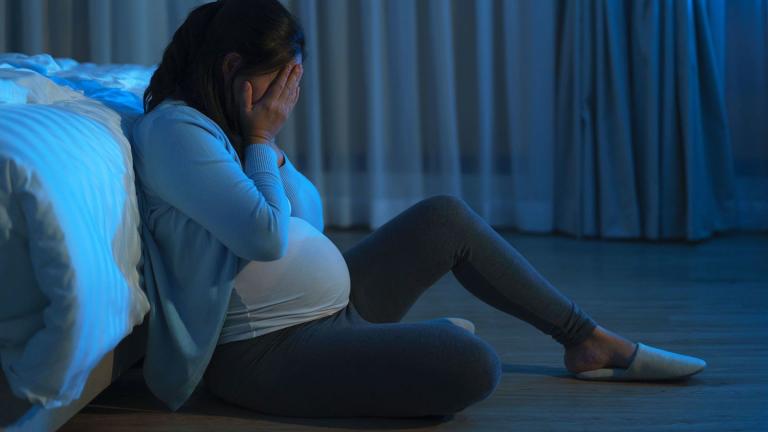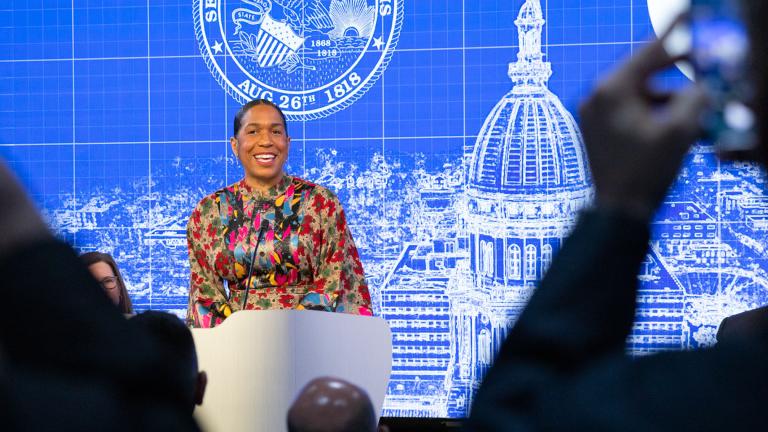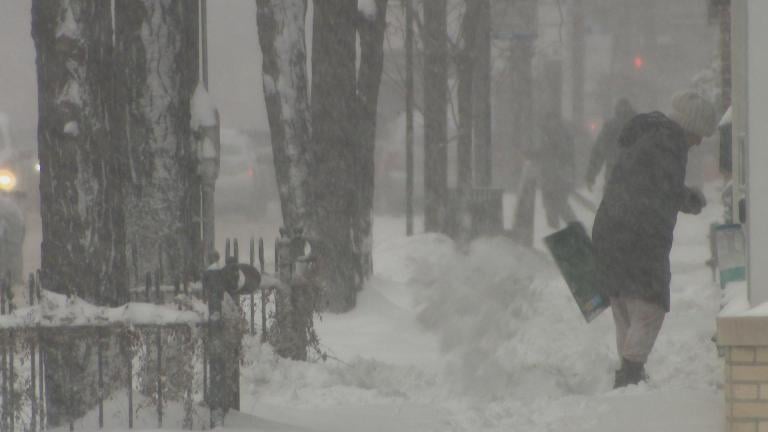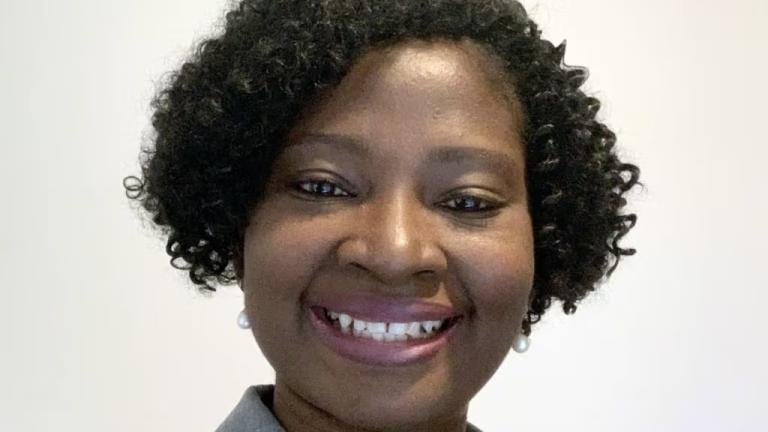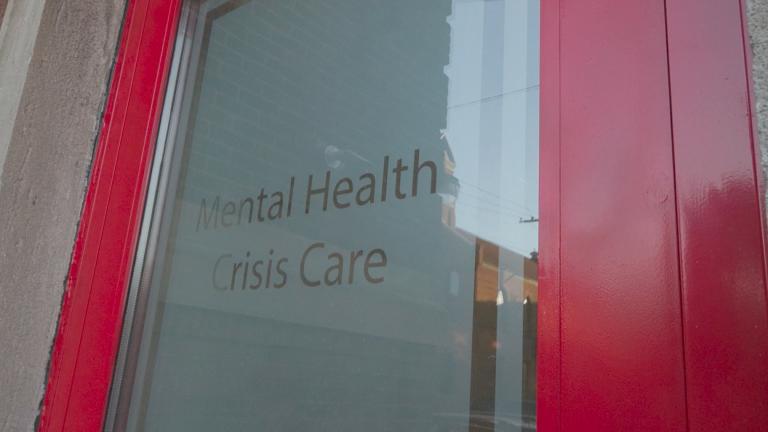 Mayor Lori Lightfoot Lightfoot discusses mental health care at an event at Access Community Health Network in Back of the Yards. (Chicago Mayor's Office)
Mayor Lori Lightfoot Lightfoot discusses mental health care at an event at Access Community Health Network in Back of the Yards. (Chicago Mayor's Office)
Mayor Lori Lightfoot said Monday that her strategy to fill the “significant gaps” in Chicago’s mental health care system that she inherited by expanding city funding for nonprofit organizations — but not reopening city-run clinics — is succeeding.
“We are already seeing tremendous results from that transformation,” said Lightfoot at an event at Access Community Health Network’s Back of the Yards facility. “We have completely revamped our approach to mental health.”
After making her bid for a second term as mayor official less than a week ago, Lightfoot announced Monday that the Chicago Department of Health would award $3.1 million to 12 nonprofit organizations to provide mental health services across Chicago.
That will bring the number of nonprofit groups using city funds to provide mental health care as part of what officials call the city’s Trauma-Informed Centers of Care to 50 organizations and allow an anticipated 60,000 Chicagoans to get behavioral health care in all 77 Chicago community areas during 2022, Lightfoot said.
That represents a massive increase from 2019, when the city provided mental health care to 3,651 patients mostly though 12 city-run mental health clinics, Lightfoot said. That “one size fits all” system was insufficient, she added.
“The fact of the matter is that we inherited a mental health system with significant gaps, particularly in communities of color,” Lightfoot said.
Former Mayor Rahm Emanuel touched off a political firestorm in 2012 when he closed six of the city’s 12 public mental health clinics to close what was, at the time, a massive budget shortfall.
During the 2019 mayoral campaign, Lightfoot joined other candidates and pledged to spend $25 million to restore the clinics. At a campaign forum, Lightfoot said that “of course we should reopen the clinics, but we have to go much further than that. We have to focus on building mental health infrastructure here in the city. There’s lots of different service providers that frankly did and do a better job delivering services to people that are in need than the clinics did.”
By October 2019, Lightfoot made it clear that she would not reopen the clinics closed by Emanuel, angering progressive alderpeople and groups who accused the mayor of breaking a campaign promise.
Lightfoot’s pick to run the Chicago Department of Public Health, Dr. Allison Arwady, saw her confirmation delayed by several months after she fully backed the mayor’s decision not to reopen the clinics.
In addition, Lightfoot never convinced the General Assembly to allow the city to change the way it taxes the purchase of real estate, another campaign promise. During the campaign, Lightfoot proposed changing the flat tax to a graduated levy, which would force high-value properties to pay more. That additional revenue was to have been used to boost the city’s funding for mental health services.
But even without that additional funding, Lightfoot’s first spending plan doubled city spending on mental health to $19 million, and what Lightfoot called a “transformation” began.
Lightfoot’s approach to mental health care in Chicago — which she called “a holistic strategy” that offers “evidence-based solutions” — relies on contracting with neighborhood-based organizations that she said already have a high level of trust in Chicago neighborhoods.
“The vision has been realized,” said Lightfoot, calling herself a “fierce advocate” for mental health care. “We are on the right path.”
But Ald. Rossana Rodriguez Sanchez (33rd Ward), who has led the fight on the City Council to fund mental health care, has repeatedly said that city-run mental health clinics provide a higher level of care than nonprofit organizations, in part because city employees are paid more and have better benefits.
“We continue to fight for the care we all deserve,” Rodriguez Sanchez said. “For the jobs that clinicians deserve. This neoliberal model ain’t it.”
Rodriguez Sanchez said she has been unable to get details on what kind of care those 60,000 people have received and how intense that care was. City officials should be working to ensure that care is appropriate, sustainable and sufficient, Rodriguez Sanchez said.
Clinicians who are well paid and have job protections are less likely to burn out and quit, allowing them to provide continuous care to their patients, Rodriguez Sanchez said.
In 2021, progressive members of the Chicago City Council pressed Lightfoot to create a program that sends a team of social workers and paramedics in response to 911 calls for help involving someone experiencing a mental health crisis. Lightfoot agreed to set aside less than $2 million in the city’s 2021 budget to test two programs: one that sent a police officer with the social worker and paramedic and one that did not include a police officer.
Lightfoot claimed credit on Monday for those programs, saying her goal was to prevent those suffering from mental health crises and substance abuse disorders from being sent to jail.
“We don’t need people in jails, we need them getting help in the community, in clinics,” said Lightfoot, adding that she wanted to reduce unnecessary contact between those in crisis or ill with first responders.
In 2022, Lightfoot ensured that her budget would have enough votes to pass by agreeing to spend $6.3 million to hire 29 new employees at the city’s public mental health clinics, a 73% increase in staff that represents the largest investment of taxpayer funds in those clinics since 2011.
As of June 1, those newly created positions have not been filled, Rodriguez Sanchez said.
“The investment in CDPH did not go nearly far enough,” said Rodriguez Sanchez, who has continued to call for public mental health clinics to be reopened “so that more people could have access to this essential resource in their community. With clinicians who are well paid (and) can provide great care.”
Progressive members of the City Council demanded the additional funding, as did the American Federation of State, County and Municipal Employees Local 31, which represents the clinic’s staff.
In all, the city’s 2022 budget calls for $89 million to be spent on mental heath care. The bulk of that funding will be spent as part of the Chicago Recovery Plan, which is fueled by federal COVID-19 relief grants.
Contact Heather Cherone: @HeatherCherone | (773) 569-1863 | [email protected]


